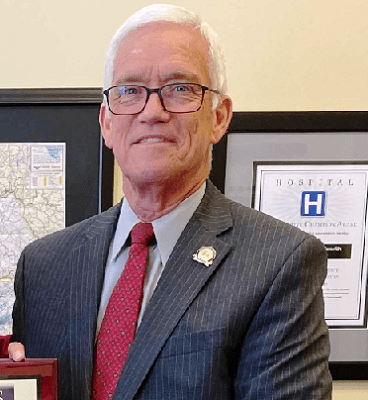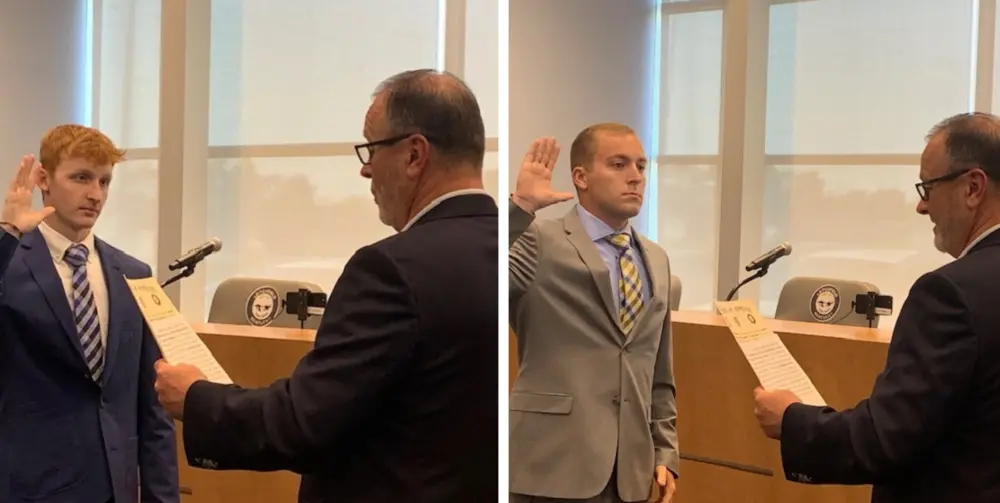
Lawmakers returned to Frankfort on Wednesday following the 10-day veto period, in which Gov. Andy Beshear was allowed time to consider all legislation that had reached his desk. The governor vetoed 15 bills in total but, likely given it is an election year, allowed several to go into law without his support (signature).
Several bills filed with the Kentucky Secretary of State’s office were measures the governor had previously expressed criticism of publicly, or his past actions indicate his philosophical disapproval of, such as:
- Senate Bill 4 prevents the retirement of fossil fuel-fired coal plants unless utility companies demonstrate that taking them offline will not harm Kentucky residents or increase their energy costs.
- Senate Bill 5 establishes a process by which parents can challenge questionable sexually explicit materials in their children’s schools.
- Senate Bill 48 adopts the recommendations from the 2022 Cabinet for Health and Family Services Organizational Structure, Operations and Administration Task Force, which is a comprehensive measure correcting some of the current mismanagement within the state’s largest executive branch.
- Senate Bill 75 ensures representation where there is taxation (parking fees) as it relates to residents and travelers in Lexington within the jurisdiction of the
Lexington & Fayette County Parking Authority, also known as LexPark. LexPark had recently increased parking fees and extended parking fee hours with little notification to residents and no public comment. SB 75 is similar to past legislation addressing the inappropriate nature of quasi-government agencies, unaccountable to the public, increasing fees on residents with little recourse. The bill ensures that elected officials have to approve any recommended fee increases.
- House Bill 39 changes the governance of the Kentucky Horse Park by amending statutory provisions governing the Kentucky Horse Park Commission.
- House Bill 264 is an economic development measure designed to attract new and maintain existing innovative companies. The bill removes burdens and red tape from companies and allows them to develop innovative products and processes in Kentucky and test those products for a year from overly restrictive laws and regulations. The companies will be supervised during this developmental period by the Kentucky Office of Regulatory Relief created within the Office of the Attorney General.
The governor exercised his constitutional authority to veto the following bills,which were added to the list of over 70 bills and resolutions he has vetoed but have been soundly overridden by the state House and Senate chambers since his inauguration.
Senate Bill 7 ensures public sector dollars are not being politically weaponized against many of the taxpayers it exists to serve by engaging in funding political action committees through automatic deductions taken directly from public employees’ paychecks.
Beshear cited several inaccuracies in his Senate Bill 7 veto message. The bill does not impede a union member’s constitutional first amendment rights. In 2022, the 6th Circuit Court of Appeals noted ‘no constitutional right to a check-off or payroll deduction system for political fundraising.’ The governor’s insinuation union members have been stripped of their ability to easily pay membership dues by requiring them to go outside the public payroll system is patently false. It has never been easier given modern technology.
Additionally, the governor alleges that for the commonwealth to be eligible for $76 million in federal transit funds, “the U.S. Department of Labor must certify that arrangements are in place to continue collective bargaining rights for employees affected by the funding.” SB 7 does not change the right established in KRS 336.130 for public employees to engage in collective bargaining. Most notably, Senate Bill 7 grandfathers in the original terms of existing collective bargaining agreements through their expiration date.
Along with other inaccuracies, the governor’s veto message is highly misleading because it concerns union dues and political contributions collected by public payroll systems, not charitable contributions or health insurance.
Senate Bill 37 was a disappointing veto. The reason for the governor’s veto lacked comprehension of its provisions. Contrary to his veto message, the bill does not allow ‘private organizations to appoint individuals to a state board.’ The measure defines the representation of an advisory council to the Kentucky Board of Pharmacy. This advisory council is not newly established in the bill; it has existed for years and the General Assembly has never defined its membership. Rather, lawmakers have delegated this membership to the discretion of the Kentucky Board of Pharmacy. The bill defines the ‘broad representation’ of members to this advisory council to bring additional resources and expertise to the board regarding the pharmacy’s current scope and practice. The board can confirm the council’s membership by a roll call vote at a public meeting. The board has always possessed the ability to select the members of its advisory council—established in statute by the Kentucky General Assembly. While Senate Bill 37 defines the representation on this advisory council, it does not remove any authority or jurisdiction from it.
Senate Bill 65 made administrative regulations found deficient by a legislative committee null and void. Although various administrative regulations were found deficient over the last year, the governor’s veto message speaks solely to the regulations related to expanding Medicaid coverage for vision, dental, and hearing services.
Members of the General Assembly urged the Beshear administration to refrain from expanding these services until the existing services provided within the Medicaid program – especially the current dental – could be sustained. Kentucky is facing a critical shortage of vision, hearing, and dental providers because of inadequate Medicaid reimbursement rates. Continuing to expand services when the current program is unsustainable and ineffective is an irresponsible policy initiative. The governor’s veto message failed to mention the provision allowing individuals to continue receiving the services initiated or rendered under the expanded program. Senate Bill 65 also clarifies that nothing prevents CHFS from increasing Medicaid reimbursement rates for dental, vision, and hearing services that existed before the expansion. Kentucky’s Medicaid program faces many difficult challenges. Look no further than the waiting list for the Michelle P. Waiver services or the much-needed reimbursement rate adjustments for services provided by long-term care or behavioral health providers. The governor’s reckless effort to expand these services at a time when there are many other recipients and Medicaid provider needs that are just as relevant and arguably more pressing is irresponsible. The governor’s message lacks vision, is tone-deaf, and lacks bite in addressing the holistic needs of Kentuckians.
Senate Bill 107 ironically and contrary to the governor’s rationale in his veto message saying the bill “politicizes the process” of hiring the commissioner of education—mitigates the governor’s own inappropriate political influence.
Only hours after Beshear was inaugurated on December 10, 2019, he dramatically politicized the Kentucky Department of Education (KDE) by completely dissolving the Kentucky Board of Education, appointing Democrats to all eleven voting-member positions, and thereby immediately paving the way for removing the state’s education chief with no just cause, then hiring current KDE Commissioner Jason Glass.
Glass, a journeyman in the education arena, had spent several years in Colorado before accepting the position of KDE commissioner. The indication is he was unsuccessful as a Jefferson County, CO Public Schools superintendent.
Rather than creating “an unnecessary bureaucratic obstacle,” as asserted by Beshear, Senate Bill 107 creates a necessary check and balance for what has sadly become nothing more than a political bureaucrat.
Senate Bill 122 does more than just give us access to parking. Generally, it gives the LRC control over its own space instead of the executive branch having control. There will still be plenty of parking for visitors, but the LRC will allocate the spaces around our building as they see fit. Additionally, it gives LRC more control over the janitorial services for the annex.
Senate Bill 126 was referred to in the governor’s veto message as an ‘unconstitutional power grab.’ The bill is a clean-up to 2021’s House Bill 3 and sets the automated process and procedure in ensuring Kentucky residents have logistical recourse in redress of their grievances against state law, executive order, or administrative regulation by allowing for a change of venue to a court closer to where they live.
Kentucky courts hold that venue is ‘purely a legislative matter.’ The Franklin Circuit Court, where cases go by default, should not hold a monopoly on hearing challenges to the constitutionality of important legislative enactments.
Beshear is incorrect in insisting Senate Bill 126 will ‘force Kentuckians to challenge the constitutionality of government actions in places where they do not live.’ The reality is that after the 2021 session, plaintiffs who justly challenged the constitutionality of his executive actions could finally redress their grievances in their home counties and courts. Before 2021’s House Bill 3, residents from 119 counties had to travel to Franklin County to challenge and seek redress from the courts. The governor never came to the defense of those Kentuckians. Senate Bill 126 is simple, and automating processes in place should not cause the costs or delays the governor imagines in his veto of the bills.
We were also disappointed by the governor’s last-minute veto of Senate Bill 226, which would provide a streamlined approach to carrying out obligations under the federal Clean Water Act. The bill was carefully drafted to ensure those obligations are carried out consistently with the act and that economic development is not hampered by personal political beliefs that skew what is legal. The legislature stands with Kentucky residents and industries that fuel our economy and overrode the grossly misguided and legally indefensible veto.
Senate Bill 241 makes amendments to statutory law, directing the Kentucky Department of Fish and Wildlife Resources (KDFWR) to acquire the Kentucky Cumberland Forest conservation easement responsibilities in southeast Kentucky that under 2022’s Senate Bill 217 were to be the responsibility of the Kentucky Finance and Administration Cabinet. The bill allows KDFWR to work with third parties to conduct due diligence and exempts the easement acquisitions from the requirement that KDFWR notify the owners of mineral interests under the properties so long as coal mining will not be inhibited. Under the bill, land surveys do not have to be completed before closing so long as the party escrows the funds needed to reconcile acreage differences upon completion of the surveys.
The bill requires the Finance and Administration Cabinet to deliver all documents relating to the due diligence it has already performed to the department on the act’s effective date and provides that the previously allocated funds for the Kentucky Cumberland Forest Conservation Program shall carry forward.
To facilitate the department’s new procurement authority and much of the department’s work, the bill allows for the creation of one or more engineering services selection committees to be established in Fish and Wildlife and sets the membership of the committees.
The bill prohibits the Finance and Administration Cabinet from excluding the department from any contracts available to multiple state agencies for the procurement of goods or services and exempts the department from any section of 45A that requires the approval of the Finance Cabinet for the department to proceed with any aspect of the procurement process.
The bill has an emergency clause so it will be effective when the General Assembly overrides the governor’s veto.
The governor’s veto of Senate Bill 150 came as no surprise as he put his party’s politics over the people of Kentucky.
The bill aims to strengthen parental engagement and communication in their children’s education. It cleared the Senate with bipartisan support. The bill reinforces a positive atmosphere in the classroom and removes unnecessary distractions, such as social pressures mandating the use of ‘preferred pronouns’ in our schools. SB 150 provides expected privacy rights for restrooms, locker rooms and shower rooms that align with a child’s biological sex. Perhaps most importantly, Senate Bill 150 prohibits the use of chemical-altering drugs for minor children and ‘gender-affirming care’ that includes genital mutilation of minor children incapable of consenting to such irreparable life-altering decisions.
Additional bill vetoes overridden include House Bills 4, 329, 395, 519, 568 and House Joint Resolution 60.
Several additional House and Senate bills were delivered to the governor in the final two days of session. Unlike the aforementioned bills, the following will not qualify for a veto override. If vetoed, they will not become state law until at least after the 2023 Legislative Session.
- Senate Bill 247 would create conditions for the continuity of education services and instruction for low-income, transient students, allowing students in grades 1, 2, or 3—on free or reduced lunch—to remain in the same school when changing residence within the same school district. The bill would require the school district to provide transportation to the school from the student’s new residence but authorize the superintendent to deny the transportation request if deemed
- Senate Bill 252 requires an owner of a motor vehicle that has been determined to be unsafe to drive or inoperable by an ASE certified mechanic to give notice to any potential buyer of this determination.
- House Bill 29
- House Bill 64 will extend the period of time that a peace officer, who was employed as a peace officer since December 1, 1998, may be separated from service before losing his or her certification status from 100 days to 365 days.
- House Bill 83 will require judgment lien notices to contain the date of final judgment and will establish expiration dates for judgment liens. Additionally, HB 83 will allow a judgment lien expiration to be postponed under certain circumstances.
- House Bill 207 will give law enforcement agencies the ability to create their own wellness programs. Additionally, HB 207 establishes that all proceedings, opinions, and records of a wellness program are privileged and not subject to subpoena, including records confidentiality maintained in accordance with a wellness program to the list of records not subject to an open records request.
- House Bill 288 will prohibit a public school district or public charter school from entering a non-disclosure agreement relating to misconduct involving a minor or student. It will also require school districts to conduct reference checks of new applicants. Applicants will be required to disclose if they are subject to allegations or investigations in the previous 12 months and consent to a reference check. Additionally, the bill will require all individuals employed by the school district to receive a state criminal background check every five years.
- House Bill 338 would allow prospective jurors to be relieved of jury duty if the individual is 70 years or older.
- House Bill 373 would remove the court security officers from the list of officers required to be certified by the Kentucky Law Enforcement Council, and allow the council to certify local alcoholic beverage control investigators appointed before April 2019.
- House Bill 401 reorganization for state police that created the Division of Records management that shall have a director who is appointed by the state police commissioner and shall report to the executive director of the Office of Technical Services.
- House Bill 551
- Consent: HBs 349, 522, 36, 115, 12, HJR 49 and SJR 83
The 2023 session was a 30-day, non-budget session. Some bills were heard in legislative committees but ultimately did not make it over the finish line. Although some measures were not enacted, it is not to say they nor their advocate’s efforts are in vain. Beginning in June, we will enter the 2023 Interim period where more in-depth policy discussions will continue in anticipation of next year’s 60-day legislative session.
I encourage you to stay engaged in the legislative process. You can find a listing of all enacted bills and those pending with the governor by visiting legislature.ky.gov. You can find archived legislative coverage at KET.org/legislature/archives.
Sen. Steve Meredith, R-Leitchfield








